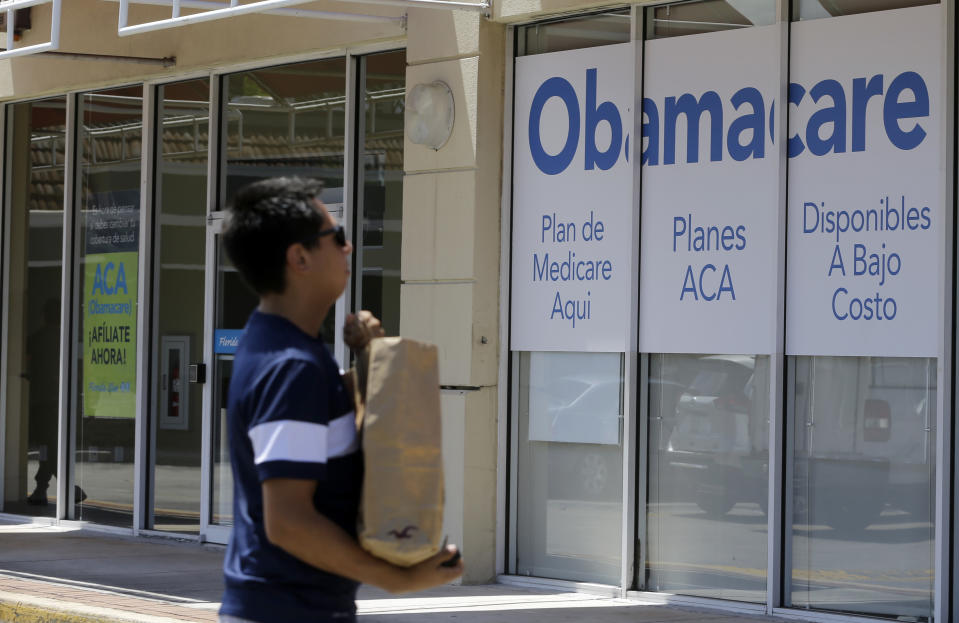Affordable Care Act: 5 key changes to ACA open enrollment 2020
Enrollment for the Affordable Care Act, or ACA, is officially open, and with it comes five key changes.
Premiums are lower, and the number of participating insurers has increased. There are new ways to sign up besides the federal marketplace. Some Americans get longer to enroll depending on where they live or their circumstances, while others may face new penalties for not signing up at all.
What hasn’t changed?
The marketplace generally functions the same way as it did before: You can buy insurance from it as long as you are a legal resident of the U.S. and not in prison.

You only qualify for financial assistance if you earn between 100% and 400% of the poverty level. You also aren’t eligible for subsidies if your employer offers affordable health coverage or you’re covered through public programs like Medicare and Medicaid.
Here’s what’s new with the Affordable Care Act 2020 and how it affects you.
Lower premiums
The monthly premium for the second-lowest silver plan on the marketplace is 4% lower for 2020, according to the Centers for Medicare & Medicaid Services.
By and large, premiums are high enough for insurers to turn a profit, so they don’t need to increase premiums for 2020, said Karen Pollitz, a senior fellow at the Kaiser Family Foundation, a nonprofit that focuses on national health issues.
In fact, many insurers overpriced their 2019 policies so much that most had to write substantial rebate checks this year to their customers.
Decreases vary by state. For instance, the average premium fell 10% or more in Delaware, Montana, Nebraska, North Dakota, Oklahoma, and Utah. But not all states saw a drop in premiums. Indiana, New Jersey, and Louisiana all experienced premium increases of 10% or more.
More insurers
The number of insurers offering plans on HealthCare.gov is higher. Twenty more issuers will participate in states that use the federal marketplace in 2020, bringing the total number of insurers to 175, the CMMS said.

This follows several years of insurers dropping out of the marketplace. In 2016, there were 237 insurers on HealthCare.gov. That figure declined to 167 in 2017 and 132 insurers in 2018.
The rise in insurers is good news for Americans. Premium rates may fall even more in states where new insurers are entering or re-entering the marketplace as current insurers try to stay competitive, Pollitz said.
New sign-up websites
For the first time, Americans can enroll for ACA through private websites operated by an insurance company or a web broker. You can even conduct an eligibility determination on some of these sites to check if you qualify for financial assistance. Previously, only HealthCare.gov could do that.
Pollitz advises people to pay close attention when using these private sites. They may or may not show all of the available marketplace plans. These sites can also sell other plans – like short-term policies – that don't adhere to ACA rules.
These non-compliant plans “are not supposed to be shown on the same screen as the marketplace policies,” Pollitz said. “But if you're not careful, you may end up looking at a bunch of cheaper plans that are short-term health insurance plans instead.”
Also for 2020 open enrollment, Nevada is the first state to administer its own health insurance exchange that is tailored to its residents. Nevada residents can enroll this year at nevadahealthlink.com.
Health coverage penalties
When first enacted, the ACA stipulated that those who didn’t have health insurance during the year had to pay a federal tax penalty, called the individual mandate penalty. It was eliminated in 2019.
However, some states have their own rules. Massachusetts, New Jersey and Washington, D.C., already have individual mandate penalties in place. Joining them in 2020 are California, Rhode Island and Vermont.

Extended deadlines
Generally, open enrollment runs from Nov. 1 through Dec. 15.
But those living in an area affected by a hurricane or other natural disaster can get extra time to sign up for coverage. An extension, though, is not automatic. To apply for one, you must call the federal marketplace call center at 1-800-318-2596.
To qualify for an extension, you must confirm that you live in or moved from areas affected by a hurricane or other natural disaster in 2019 and has been designated by FEMA as eligible to receive individual or public assistance.
Some states are giving their residents more time to sign up for health insurance. In some instances, coverage may start later than Jan. 1, 2020, if you sign up later.
California, Colorado, and Washington, D.C., all have permanently extended open enrollment for ACA. Massachusetts, Minnesota, New York and Rhode Island extended deadlines for 2020 open enrollment. Idaho also extended its deadline by one day this year, because Dec. 15 falls on a Sunday.
Read more:
Survey highlights a key consideration before applying for your next job
Young adults are taking longer to reach financial independence
Follow Yahoo Finance on Twitter, Facebook, Instagram, Flipboard, SmartNews, LinkedIn, YouTube, and Reddit.

 money
money 
